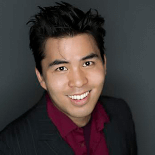MAP Annual Report: 2022
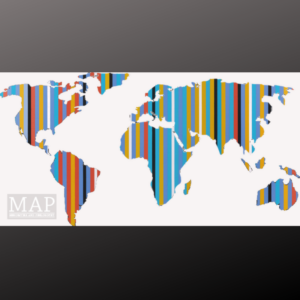
Read on to learn what MAP has done in the past year and contribute to our matching fundraiser, dollar-for-dollar, (up to $10k) by clicking the button below and completing the donation form on the MAP website.
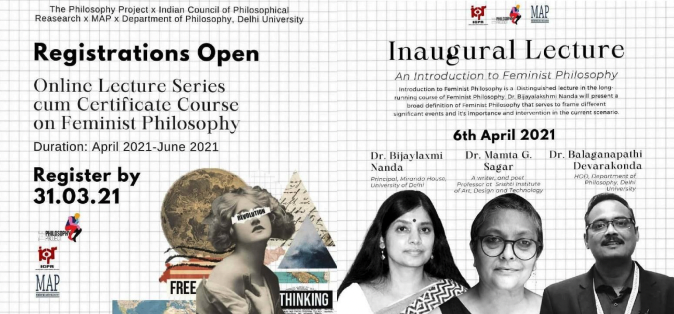
Online Course in Feminist Philosophy
(MAP Delhi University)
Dates: April – August 2021
MAP Delhi University organized an online course on Feminist Philosophy in collaboration with The Philosophy Project (TPP) and Indian Council of Philosophical Research (ICPR). A series of lectures on Feminist Philosophy and its interjections was offered online from April to August 2021.
The topics of the lectures were as follows:
- An Introduction to Feminist Philosophy
- Feminist Epistemology
- Post-Colonial Feminism
- Dalit Feminist Theory
- Feminist Bioethics
- Feminist Ethics
- Feminist Jurisprudence
- Feminism and Aesthetics
- Debates on Religion and Feminism
- Feminism and Media
- Feminist Political Philosophy
This course was offered to both philosophy and non-philosophy students. In total, 780 students have participated, and 153 students qualified the course. This was the first ever feminist philosophy course open to both philosophy and non-philosophy students in India. Some faculty members have also participated.
For lecture wise summary of events and accessing the reading list, please click here.
For accessing the recording of lectures, please click here.
–Megha Arora (MAP Delhi University)
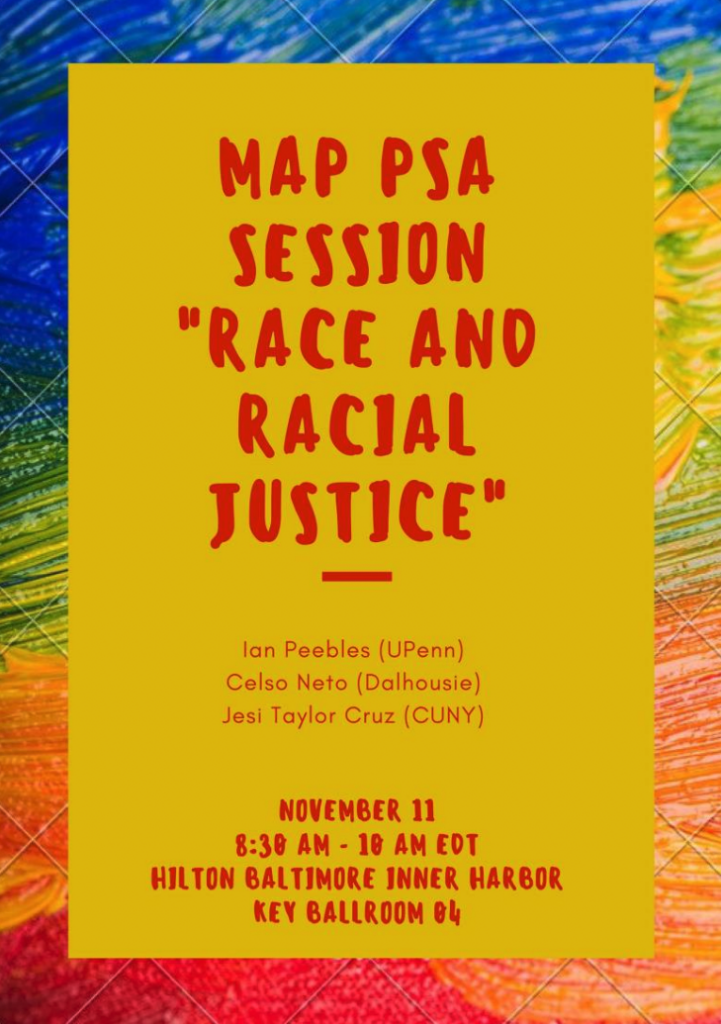
MAP PSA Session
Date: November 11, 2021
We organized a MAP special session (hybrid) on November 11, 2021 at the Philosophy of Science Association meeting in Baltimore. The topic of the special session was “Race and Racial Justice,” and it featured three talks on the topic from early career philosophers. Ian Peebles (UPenn) started off the session with a talk on “To Race or Not to Race: When (If Ever) Is It Morally Permissible to Use a Biological Racial Classification in Medicine?.” Celso Neto (Dalhousie) then spoke on “The Metaphysics of Race meets Inductive Risk: Issues for the New Deflationary Biological Race Realism.” Finally, Jesi Taylor Cruz (CUNY) gave a talk on “Carceral Wastelands: On Waste Inequity and Mass Incarceration in the US.” The session was chaired by Jingyi Wu (UCI). This well-attended session provided a much-needed space within the philosophy of science community to reflect on how scientific practices intersect with racial issues in the US and envision interventions that would bring about racial justice in our society.
We organized a MAP special session (hybrid) on November 11, 2021 at the Philosophy of Science Association meeting in Baltimore. The topic of the special session was “Race and Racial Justice,” and it featured three talks on the topic from early career philosophers. Ian Peebles (UPenn) started off the session with a talk on “To Race or Not to Race: When (If Ever) Is It Morally Permissible to Use a Biological Racial Classification in Medicine?.” Celso Neto (Dalhousie) then spoke on “The Metaphysics of Race meets Inductive Risk: Issues for the New Deflationary Biological Race Realism.” Finally, Jesi Taylor Cruz (CUNY) gave a talk on “Carceral Wastelands: On Waste Inequity and Mass Incarceration in the US.” The session was chaired by Jingyi Wu (UCI). This well-attended session provided a much-needed space within the philosophy of science community to reflect on how scientific practices intersect with racial issues in the US and envision interventions that would bring about racial justice in our society.
–Jingyi Wu (UC MAP)
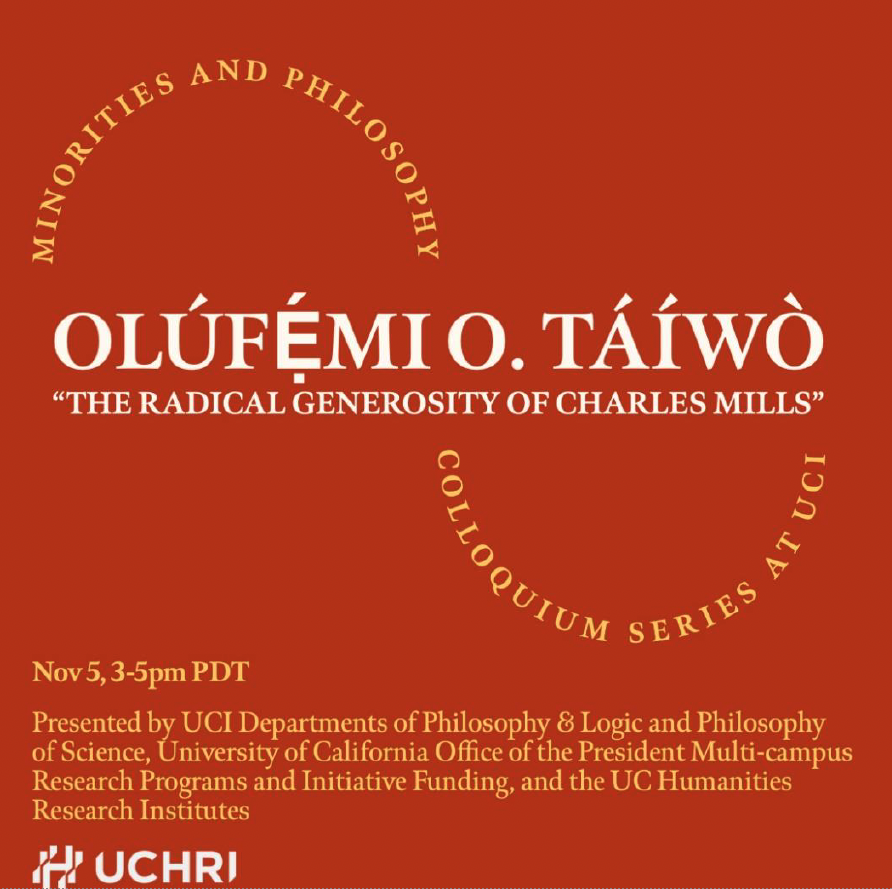
UC MAP
Dates: September 2021 – now
As part of the UCHRI grant on a MAP Californian consortium that Jingyi Wu (UCI) and Milana Kostic (UCSD) received, MAP University of California Regional Network was formed. One of the events organized as a part of this project was MAP Colloquium with Olúfẹmi O. Táíwò (Georgetown) on November 5, 2021, organized by the UCI MAP chapter. Táíwò gave a talk on “The Radical Generosity of Charles Mills,” detailing Mills’ personal intellectual trajectories, his contributions to academic philosophy, his generous mentorship to young philosophers of color, and how he influences Táíwò’s own work. As part of the Colloquium initiative, Táíwò also participated in a mentorship hour with graduate students from three different philosophy departments in the UC system.
This event provided community for MAP members, especially philosophers of color, to reflect on the legacy of Mills, and to grow as a result.
This event provided community for MAP members, especially philosophers of color, to reflect on the legacy of Mills, and to grow as a result.
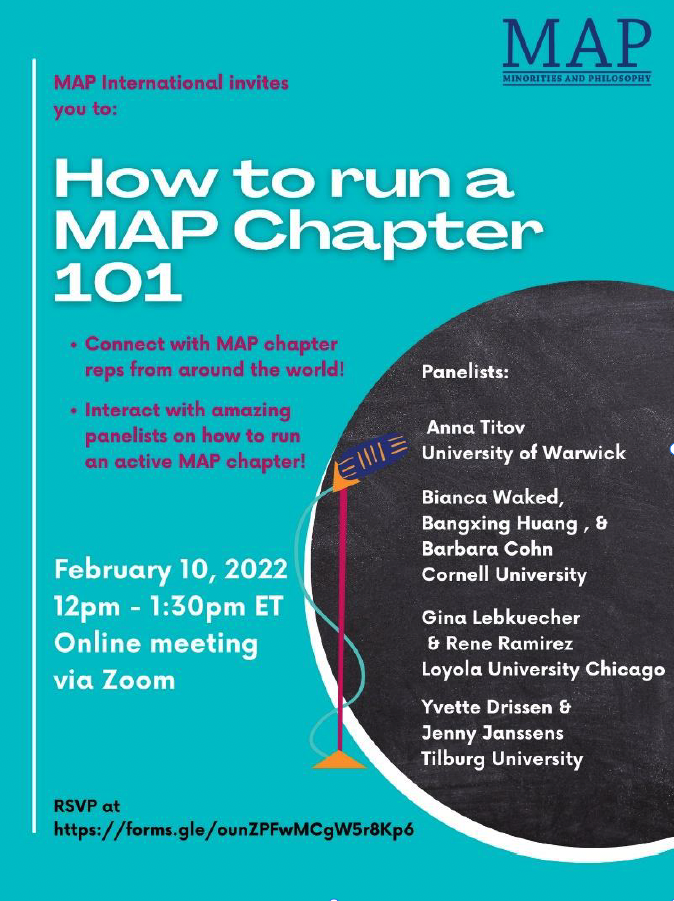
How to Run a MAP Chapter 101
Date: February 10, 2022
In response to popular requests by MAP chapter representatives, on February 10, 2022, we organized a virtual workshop on “Running a MAP chapter 101”. Our panelists came from a diverse range of institutional and MAP organizing backgrounds: Anna Titov (Warwick), Gina Lebkuecher and Rene Ramirez (Loyola University Chicago), Yvette Drissen and Jenny Janssens (Tilburg), Bangxing Huang, Barbara Cohn, Bianca Waked (Cornell). During the workshop Anna Titov (MAP Warwick), Bangxing Huang, Barbara Cohn, and Bianca Waked (MAP Cornell) shared their tips on starting a MAP chapter, avoiding burnout, and sustaining interest and commitment within the chapter.
Gina Lebkuecher and Rene Ramirez (MAP Loyola University Chicago) shared programming ideas with the audience and talked about the events they organize regularly (among them Monthly Public Philosophy Talks, reading groups on Ethics, Feminist, Queer, and Disability Studies, Filosofía en Español, Indian and South-Asian Philosophy, Latinx Perspectives, Philosophy and Literature, Zen Philosophy, Islamic Philosophy, workshops on applying to Grad and Law School and on Philosophical Reading / Writing, Movie Nights, MAP Summer Living Philosophy Retreat, MAP Mentorship and Advising).
In addition to that, Gina Lebkuecher and Rene Ramirez shared tips on starting a chapter and gaining momentum, maintaining and growing MAP membership, engaging undergraduate students, and on fundraising.
Yvette Drissen and Jenny Janssens (MAP Tilburg) talked about some of the most successful and impactful events their chapter organized. Recordings of some of the exemplary events are available on YouTube: What about Diversity and Shooting the Canon.1 In addition to that, MAP Tilburg chapter representatives discussed some of the organizing challenges they face, their organizing structure and their future goals.
Over 20 MAP chapter representatives attended the session and discussed the challenges in organizing they face and the suggestions on how to overcome them.
–Milana Kostic (MAP International)
1 Note: MAP International did not financially support these two events.
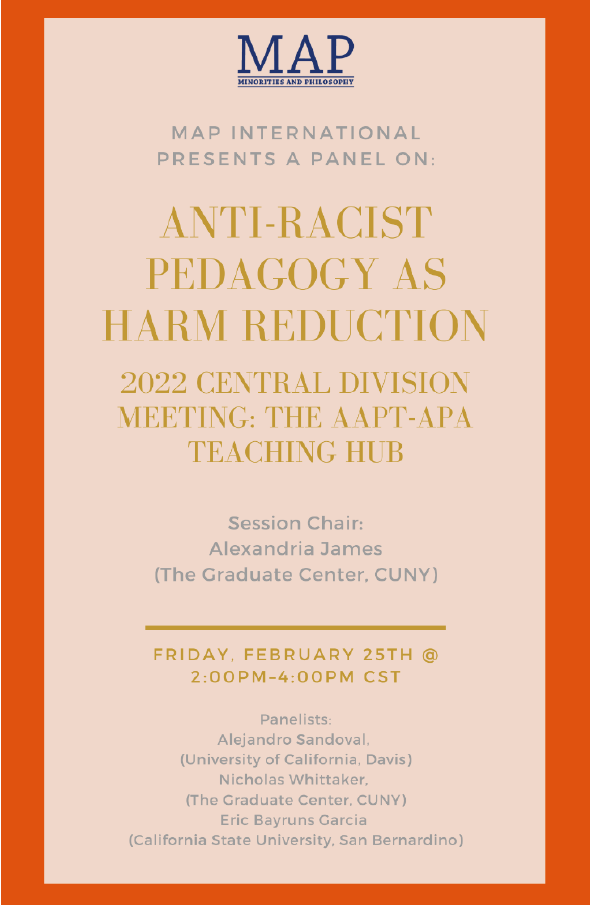
Central APA Session
Date: February 25, 2022
At the 2022 APA Central Conference, held from February 23-26, MAP International hosted a panel sponsored by the APA Committee on the Philosophy of Teaching (CPT) and the AAPT (American Association of Philosophy Teachers), for the AAPT- APA Teaching Hub. The panelists were Eric Bayruns Garcia and Alejandro Naranjo Sandoval, and MAP organizer Alexandria James chaired the session. The panel, titled “Anti-racist Pedagogy as Harm Reduction”, explored the nuances of diversifying the philosophy curriculum and teaching practices, so that we may foster greater learning outcomes more broadly. We asked the panelists three broad questions: 1) “What does it mean to take anti-racism seriously in one’s curriculum/pedagogy?” 2) “How does one do this as a professor of color in a way that does not overburden oneself or put oneself in danger?” 3) “How does one do this as a white professor in a way that makes one sit in their discomfort and includes the voices of BIPOC without overburdening them/leaving them uncompensated?”
In asking these questions, we hoped to facilitate a dialogue that explored the implications of what it means to ask the discipline to commit to incorporating scholarship that is typically not designated as “philosophy” whilst critically engaging with the social and political implications of evaluating what ultimately is, and is not, considered “philosophy”.
The conversation was deeply generative, spanning ways to renew classroom dynamics, possible ways of defending the necessity for particularly race-related discourse especially dealing with growing legislative pushback against teaching histories that center race and trouble the ethnocentric justifications for political and philosophical trajectories that continue to be supported. Many participants commented that they felt they had actionable ways of reengaging their respective departments. Folks expressed feedback hoping for the opportunity to continue the conversation in order to maintain ongoing efforts and were grateful to honestly and thoroughly engage in this dialogue.
Melissa Jacquart, MAP’s primary point of contact through organizing the event, informed us that we had 20 people sign-in for the session, which she eagerly shared was “the largest number of attendees across all our sessions!” Alexandria James, the chair of the panel, also noted that attendees stayed for the duration of the panel and were actively engaged throughout presentations and the conversation.
–Alexandria James (MAP International)
“This was the most generative pedagogy event I’ve attended. And I’ve attended quite a few.”
-Eric Bayruns Garcia
“It felt like a productive session, and I benefited greatly from the general discussion.”
-Alejandro Naranjo Sandoval
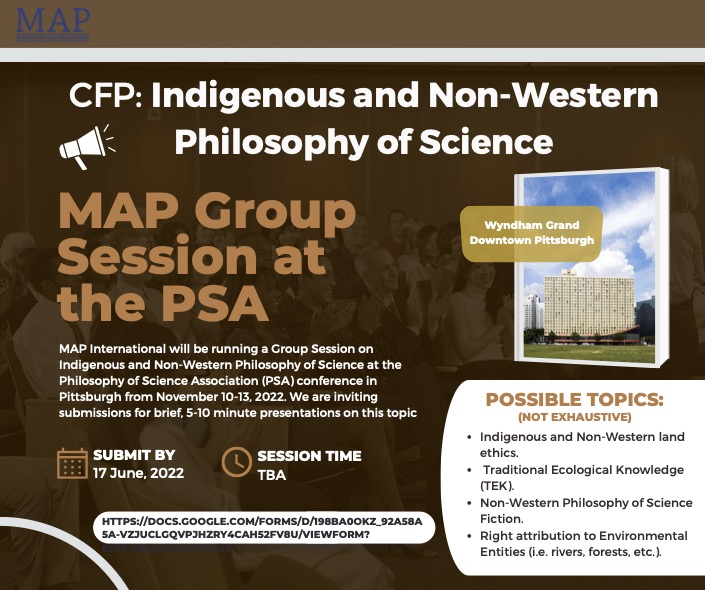
Group Session at the PSA
November 2022
At the Philosophy of Science Association (PSA)’s 28th Biennial meeting in November, 2022, MAP held a session on Indigenous and non-Western philosophy of science. The panel, which was chaired by MAP organizer Lel Jones, featured Professor Shelbi Nahwilet Meissner of Georgetown University and Federica Bocchi of Boston University. The session began with a dialogue about how we can engage in conservation that serves Indigenous communities.
Participants discussed possible interventions in the conservation movement, including new methods of evaluating progress and success in conservation efforts. Conference-goers showed great interest in MAP’s session, which was standing room only.
